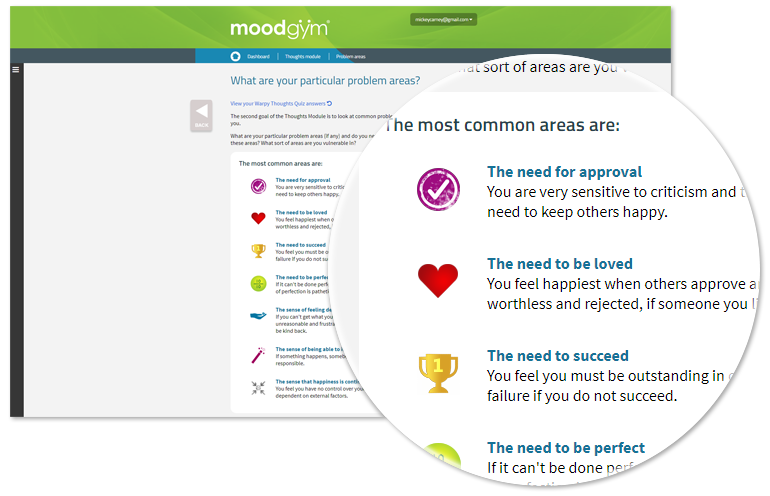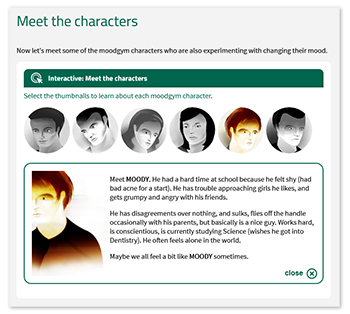Peer-reviewed publications reporting on studies of moodgym:
McDermott, R., & Dozois, D. J. A. (2019). A randomized controlled trial of Internet-delivered CBT and
attention bias modification for early intervention of depression. Journal of Experimental
Psychopathology, 10(2), 2043808719842502.
Dorow, M., Stein, J., et al. (2018). Implementation of the Internet-Based Self-Management Program
"moodgym" in Patients with Depressive Disorders in Inpatient Clinical Settings - Patient and Expert
Perspectives. Psychiatr Prax, 45(5), 256-62.
Howell, A. N., Rheingold, A. A., et al. (2018). Web-based CBT for the prevention of anxiety symptoms
among medical and health science graduate students. Cognitive Behaviour Therapy, 1-21.
Lobner, M., Pabst, A., et al. (2018). Computerized cognitive behavior therapy for patients with mild to
moderately severe depression in primary care: A pragmatic cluster randomized controlled trial
(@ktiv). J Affect Disord, 238, 317-26.
Gilbody, S., Brabyn, S., et al. (2017). Telephone-supported computerised cognitive–behavioural therapy:
REEACT-2 large-scale pragmatic randomised controlled trial. The British Journal of Psychiatry,
210(5), 362-267.
Healey, B. J., Griffiths, K. M., & Bennett, K. (2017). The effect of programme testimonials on
registrations for an online cognitive behaviour therapy intervention: a randomised trial. Digital
Health, 3, 2055207617729937.
Lobner, M., Stein, J., et al. (2017). Innovative E-Health-Ansatze fur komorbide Depressionen bei Patienten mit
Adipositas: Nutzungsakzeptanz aus Patienten- und Expertenperspektive. [Innovative E-Health Approaches
for Comorbid Depression in Patients with Obesity: Patient and Expert Perspectives on User
Acceptance]. Psychiatr Prax, 44(5), 286-95.
Yeung, A., Wang, F., et al. (2017). Outcomes of an online computerized cognitive behavioral treatment
program for treating chinese patients with depression: A pilot study. Asian Journal of Psychiatry,
38, 102-7.
Brabyn, S., Araya, R., et al. (2016). The second Randomised Evaluation of the Effectiveness,
cost-effectiveness and Acceptability of Computerised Therapy (REEACT-2) trial: does the provision of
telephone support enhance the effectiveness of computer-delivered cognitive behaviour therapy? A randomised
controlled trial. Health Technol Assess, 20(89), 1-64.
Twomey, C., & O’Reilly, G. (2016). Effectiveness of a freely available computerised cognitive
behavioural therapy programme (MoodGYM) for depression: Meta-analysis. Australian and New Zealand
Journal of Psychiatry, 51(3), 260-9.
Gilbody, S., Littlewood, E., et al. (2015). Computerised cognitive behaviour therapy (cCBT) as treatment
for depression in primary care (REEACT trial): large scale pragmatic randomised controlled trial.
BMJ, 351.
Guille, C., Zhao, Z., et al. (2015). Web-based cognitive behavioral therapy intervention for the
prevention of suicidal ideation in medical interns: A randomized clinical trial. JAMA Psychiatry,
1-7.
Sorensen Hoifodt, R., Mittner, M., et al. (2015). Predictors of Response to Web-Based Cognitive
Behavioral Therapy With High-Intensity Face-to-Face Therapist Guidance for Depression: A Bayesian
Analysis. Journal of Medical Internet Research, 17(9), 1-22.
Kolstrup, N. (2014). The Internet as a medium for delivering treatment for depression. Possibilities and
challenges highlighted by our experiences with MoodGYM. Tidsskrift for Forskning i Sygdom og
Samfund, 21, 19-36.
Lillevoll, K. R., Vangberg, H. C., et al. (2014). Uptake and adherence of a self-directed internet-based
mental health intervention with tailored e-mail reminders in senior high schools in Norway. BMC
Psychiatry, 14, 14.
Menga, G., Ing, S. M. D., et al. (2014). Fibromyalgia: Can Online Cognitive Behavioral Therapy
Help? The Ochsner Journal, 14(3), 343-9.
Phillips, R., Schneider, J., et al. (2014). Randomized controlled trial of computerized cognitive
behavioural therapy for depressive symptoms: effectiveness and costs of a workplace intervention.
Psychological Medicine, 44(4), 741-52.
Schneider, J., Sarrami Foroushani, P., et al. (2014). Acceptability of online self-help to people with
depression: users' views of MoodGYM versus informational websites. Journal of Medical Internet
Research, 16(3), e90.
Twomey, C., O'Reilly, G., et al. (2014). A randomized controlled trial of the computerized CBT programme,
MoodGYM, for public mental health service users waiting for interventions. Br J Clin Psychol,
53(4), 433-50.
Wilhelmsen, M., Høifødt, R. S., et al. (2014). Norwegian General Practitioners’ Perspectives on
Implementation of a Guided Web-Based Cognitive Behavioral Therapy for Depression: A Qualitative
Study. Journal of Medical Internet Research, 16(9), e208.
Calear, A. L., Christensen, H., et al. (2013). Adherence to the MoodGYM program: outcomes and predictors
for an adolescent school-based population. J Affect Disord, 147(1-3), 338-44.
Christensen, H., Farrer, L., et al. (2013). The effect of a web-based depression intervention on suicide
ideation: secondary outcome from a randomised controlled trial in a helpline. BMJ Open, 3(6).
Donker, T., Batterham, P. J., et al. (2013). Predictors and moderators of response to internet-delivered
Interpersonal Psychotherapy and Cognitive Behavior Therapy for depression. J Affect Disord, 151(1),
343-51.
Donker, T., Bennett, K., et al. (2013). Internet-Delivered Interpersonal Psychotherapy Versus
Internet-Delivered Cognitive Behavioral Therapy for Adults With Depressive Symptoms: Randomized Controlled
Noninferiority Trial. Journal of Medical Internet Research, 15(5), e82.
Hoifodt, R. S., Lillevoll, K. R., et al. (2013). The clinical effectiveness of web-based cognitive
behavioral therapy with face-to-face therapist support for depressed primary care patients: randomized
controlled trial. Journal of Medical Internet Research, 15(8), e153.
Lillevoll, K. R., Wilhelmsen, M., et al. (2013). Patients' experiences of helpfulness in guided
internet-based treatment for depression: qualitative study of integrated therapeutic dimensions.
Journal of Medical Internet Research, 15(6), e126.
Lintvedt, O. K., Griffiths, K. M., et al. (2013). Evaluating the translation process of an Internet-based
self-help intervention for prevention of depression: a cost-effectiveness analysis. Journal of
medical Internet research, 15(1), e18.
Lintvedt, O. K., Griffiths, K. M., et al. (2013). Evaluating the effectiveness and efficacy of unguided
internet-based self-help intervention for the prevention of depression: a randomized controlled
trial. Clinical Psychology & Psychotherapy, 20(1), 10-27.
Powell, J., Hamborg, T., et al. (2013). Effectiveness of a web-based cognitive-behavioral tool to improve
mental well-being in the general population: randomized controlled trial. Journal of Medical
Internet Research, 15(1), e2.
Sethi, S. (2013). Treating Youth Depression and Anxiety: A Randomised Controlled Trial Examining the
Efficacy of Computerised versus Face‐to‐face Cognitive Behaviour Therapy. Australian Psychologist,
48(4), 249-57.
Wilhelmsen, M., Lillevoll, K., et al. (2013). Motivation to persist with internet-based cognitive
behavioural treatment using blended care: a qualitative study. BMC Psychiatry, 13, 296.
Farrer, L., Christensen, H., et al. (2012). Web-Based Cognitive Behavior Therapy for Depression With and
Without Telephone Tracking in a National Helpline: Secondary Outcomes From a Randomized Controlled
Trial. Journal of medical Internet research, 14(3), e68.
Ellis, L., Campbell, A., et al. (2011). Comparative randomized trial of an online cognitive-behavioral
therapy program and an online support group for depression and anxiety. Journal of Cybertherapy and
Rehabilitation, 4(4), 461-7.
Farrer, L., Christensen, H., et al. (2011). Internet-Based CBT for Depression with and without Telephone
Tracking in a National Helpline: Randomised Controlled Trial. PLoS One, 6(11), e28099.
Hickie, I. B., Davenport, T. A., et al. (2010). Practitioner-supported delivery of internet-based
cognitive behaviour therapy: evaluation of the feasibility of conducting a cluster randomised trial.
Med J Aust, 192(11 Suppl), S31-5.
Hind, D., O’Cathain, A., et al. (2010). The acceptability of computerised cognitive behavioural therapy
for the treatment of depression in people with chronic physical disease: A qualitative study of people with
multiple sclerosis. Psychology & Health, 25(6), 699-712.
Sethi, S., Campbell, A. J., & Ellis, L. A. (2010). The Use of Computerized Self-Help Packages to
Treat Adolescent Depression and Anxiety. Journal of Technology in Human Services, 28(3), 144-60.
Topolovec-Vranic, J., Cullen, N., et al. (2010). Evaluation of an online cognitive behavioural therapy
program by patients with traumatic brain injury and depression. Brain Injury, 24(5), 762-72.
Calear, A. L., Christensen, H., et al. (2009). The YouthMood Project: a cluster randomized controlled
trial of an online cognitive behavioral program with adolescents. J Consult Clin Psychol, 77(6),
1021-32.
Neil, A. L., Batterham, P., et al. (2009). Predictors of adherence by adolescents to a cognitive behavior
therapy website in school and community-based settings. Journal of Medical Internet Research,
11(1), e6.
O'Kearney, R., Kang, K., et al. (2009). A controlled trial of a school-based Internet program for
reducing depressive symptoms in adolescent girls. Depress Anxiety, 26(1), 65-72.
Batterham, P. J., Neil, A. L., et al. (2008). Predictors of adherence among community users of a
cognitive behavior therapy website. Patient Prefer Adherence, 2, 97-105.
Burgess, N., Christensen, H., et al. (2008). Mental health profile of callers to a telephone counselling
service. J Telemed Telecare, 14(1), 42-7.
Mackinnon, A., Griffiths, K. M., & Christensen, H. (2008). Comparative randomised trial of online
cognitive-behavioural therapy and an information website for depression: 12-month outcomes. The
British Journal of Psychiatry, 192(2), 130-4.
Christensen, H., & Griffiths, K. (2007). Reaching standards for dissemination: a case study.
Stud Health Technol Inform, 129(Pt 1), 459-63.
Christensen, H., Griffiths, K., et al. (2006). Free range users and one hit wonders: community users of
an Internet-based cognitive behaviour therapy program. Australian and New Zealand Journal of
Psychiatry, 40(1), 59-62.
Christensen, H., Griffiths, K. M., et al. (2006). Online randomized controlled trial of brief and full
cognitive behaviour therapy for depression. Psychological Medicine, 36(12), 1737-46.
O'Kearney, R., Gibson, M., et al. (2006). Effects of a cognitive-behavioural internet program on
depression, vulnerability to depression and stigma in adolescent males: a school-based controlled
trial. Cognitive Behaviour Therapy, 35(1), 43-54.
Christensen, H., Griffiths, K. M., & Jorm, A. F. (2004). Delivering interventions for depression by
using the internet: randomised controlled trial. BMJ, 328(7434), 265.
Christensen, H., Griffiths, K. M., et al. (2004). A comparison of changes in anxiety and depression
symptoms of spontaneous users and trial participants of a cognitive behavior therapy website.
Journal of Medical Internet Research, 6(4), e46.
Griffiths, K. M., Christensen, H., et al. (2004). Effect of web-based depression literacy and
cognitive-behavioural therapy interventions on stigmatising attitudes to depression: randomised controlled
trial. The British Journal of Psychiatry, 185, 342-9.
Christensen, H., Griffiths, K. M., & Korten, A. (2002). Web-based cognitive behavior therapy:
analysis of site usage and changes in depression and anxiety scores. Journal of Medical Internet
Research, 4(1), e3.



